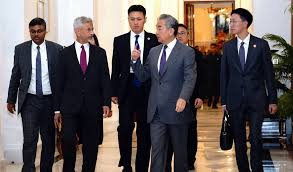
Wang Yi begins India trip; Jaishankar stresses need to advance de-escalation process

 :
| Updated On: 19-Aug-2025 @ 12:18 pm
:
| Updated On: 19-Aug-2025 @ 12:18 pmSHARE
Chinese Foreign Minister Wang Yi began a two-day visit to India on Monday, his first since the November 2024 disengagement along the Line of Actual Control (LAC). The visit comes ahead of Prime Minister Narendra Modi’s likely first trip to China in seven years for the Shanghai Cooperation Organisation (SCO) summit in Tianjin (August 31–September 1). This visit is also the first by a Chinese minister since Modi met Chinese President Xi Jinping at the BRICS summit in Russia’s Kazan in October 2024, when both sides agreed on troop disengagement at friction points in eastern Ladakh and the resumption of patrolling.
Shortly after arriving in Delhi, Wang met External Affairs Minister S. Jaishankar, who underscored that the “de-escalation process” along the border must “move forward.” Jaishankar emphasized that India-China ties require a candid, constructive approach rooted in the “three mutuals” — mutual respect, mutual sensitivity, and mutual interest. He warned that differences should not escalate into disputes or conflicts. Stressing that peace and stability in border areas are prerequisites for any positive momentum in bilateral ties, he said both nations must jointly maintain tranquility. He also highlighted counter-terrorism as a priority, indirectly referencing Pakistan’s role, though avoiding mention of China’s military support to Islamabad.
Wang will also call on Modi and meet National Security Advisor (NSA) Ajit Doval for the 24th round of Special Representatives’ boundary talks. The last time Wang visited in April 2022, he was not granted a meeting with Modi. Doval, India’s Special Representative for boundary talks, had travelled to China in December 2024, the first such visit after five years of border standoff. Although disengagement has been completed at several points, nearly 50,000–60,000 troops remain deployed on each side of the LAC, and discussions are ongoing about further de-escalation and de-induction.
Jaishankar noted that as the world’s two largest nations, India and China must also discuss the global situation. He called for a fair, balanced, and multipolar world order, including in Asia, along with “reformed multilateralism” to stabilize the global economy. He also cited the need for stronger cooperation on trade, connectivity, people-to-people exchanges, pilgrimages, and river data sharing.
On social media after the meeting, Jaishankar said he had “productive conversations” with Wang on economic issues, connectivity, border trade, and regional and global concerns. He expressed confidence that the talks would contribute to a stable and forward-looking relationship between India and China.
In Beijing, Chinese Foreign Ministry spokesperson Mao Ning praised the role of the Special Representatives’ talks, saying they had helped both sides reach several important common understandings on boundary management, mechanisms, and cross-border cooperation. Mao said China looks forward to continuing in-depth communication, following through on existing agreements, and maintaining peace along the border. She added that China hopes to strengthen political trust, enhance cooperation, properly manage differences, and promote steady bilateral relations.
As part of normalization, India and China have resumed the Kailash Mansarovar Yatra, reintroduced tourist visas for Chinese nationals, and are considering restoring direct flights. In recent months, Foreign Secretary Vikram Misri, Defence Minister Rajnath Singh, Jaishankar, and NSA Doval have all engaged with Chinese counterparts.